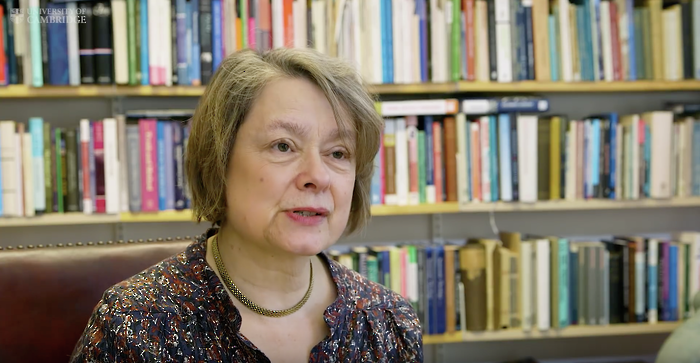Superiority complexes, complex numbers, and the divide in mathematics
Joseph Krol discusses the bridge between two branches of mathematics, and the rift between how they believe their work relates to the world

The feud between pure and applied mathematics must be fairly mystifying to people outside of it. There are these two large groups of people, both doing apparently broadly similar work, and yet the differing natures of their work leads them, for the most part, to strikingly contrasting views on their subject as it relates to the world.
Needless to say, it’s almost entirely good-natured, but the cultural divide is genuinely noticeable - problem sheets take on very different styles, for instance. It's difficult to go too far into generalities, but the stereotypes, at least, are clear: the pure mathematician wasting away years on obvious-seeming technicalities, versus the applied mathematician loafing about with a spanner, approximating any equation that requires the slightest smidge of thought.
The structure of Cambridge’s maths department(s) is pretty curious. Although they’re all located together at the CMS up by Churchill, the site is split down the middle: on the left-hand side lies DAMTP, the Department of Applied Mathematics and Theoretical Physics. Hardly fifty metres over lies DPMMS - the Department of Pure Mathematics and Mathematical Statistics - which has a decidedly different focus.
DAMTP split off from the rest of the mathematics department in the late 1950s, and immediately set itself to a fairly new educational philosophy. Although Cambridge mathematics, and indeed British mathematics as a whole, had had a noticeably applied slant since Victorian times, it was still taught in a very dry, theoretical manner; although there were some notable exceptions, Stokes among them, the links to real physical interpretations were hardly emphasised. DAMTP’s founder, the Australian fluid dynamicist George Batchelor, encouraged the new department to take a positive attitude towards experimentalism, going so far as to insist on the construction of an expansive fluids laboratory on the premises.
“They’re led to strikingly contrasting views on their subject as it relates to the world”
This lurch - a relatively extreme one by the standards of mathematics - no doubt contributes to the feeling that the two sides of the faculty aren't quite doing the same subject. However, there are certainly deeper reasons for the cultural split. Mathematics, in a very broad sense, sets itself apart as the study of necessary truths - that is, ones following entirely from logical deduction, rather than being reliant on making observations of reality.
The tendency of pure mathematics to stay closer to these systematic roots arguably places it much tighter to this idealistic conception of the subject. Applied is a little more worldly, still perfectly well-grounded in logic, but largely more willing to take less 'ideal' routes if it means that a workable solution will follow. Both of these quasi-moral justifications, though, are really very rarely considered, at least consciously - most people edge towards one or the other based more on their personal inclinations as to style, rather than any highfalutin explanation.
The absurdity is - as hardly needs to be mentioned - that the division is not terribly well-defined in any case. Certainly it makes sense at either extreme, but there are vast swathes in between where such attempts to categorise are close to pointless. A fair amount of pure maths goes more-or-less straight into the ‘real world’, whereas there is, no doubt, plenty of nominally applied work that won’t see industry for decades. Not one of these boundaries - those within mathematics, between it and (the rest of) science, or wherever - could ever be meaningfully demarcated, and the value of such a task would never be much more than merely administrative.
It’s interesting, though, that situations like this - two subfields set against each other, one of which presupposes itself as inherently superior - recurs across academia: within mathematics, mathematicians against experimentalists, sciences against humanities, and so forth. Setting up these academic hierarchies is rarely very productive; indeed, the tendency of certain academics to take immense pride in just how little connection they have to real-world applications can easily have detrimental outcomes.
The truth is that much of the time, protestations that one's work is purely academic are all but abnegations of personal responsibility, as if by taking the stance that one's work could never be truly applied to anything, there fail to be any ethical implications worth worrying about.
Physicists largely discovered the horrors laying dormant within such an attitude with the nuclear proliferation following World War Two; for many mathematicians, however, such a realisation has yet to come. With ever more mathematically-sophisticated developments in cryptography and finance, one wonders for how long these matters can be ignored.
There are many subtexts below idle feuds like these, of which this is merely one. For the most part, it must be remembered, it is all entirely light-hearted, but there is nevertheless an inherent disagreement within it which demonstrates a quite genuine rift between views on the role and purpose of academic work. Universities do not exist in a vacuum; to pretend otherwise is folly.
 Features / Cloudbusting: happy 10th birthday to the building you’ve never heard of30 March 2025
Features / Cloudbusting: happy 10th birthday to the building you’ve never heard of30 March 2025 News / Uni offers AI course for Lloyds employees30 March 2025
News / Uni offers AI course for Lloyds employees30 March 2025 News / Caius clock hand returned nearly 100 years after student prank31 March 2025
News / Caius clock hand returned nearly 100 years after student prank31 March 2025 News / Hundreds of jobs to be cut at Cambridge University Hospitals1 April 2025
News / Hundreds of jobs to be cut at Cambridge University Hospitals1 April 2025 News / Ski mask-wearing teens break into Caius accommodation27 March 2025
News / Ski mask-wearing teens break into Caius accommodation27 March 2025





